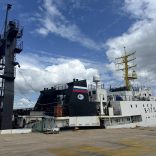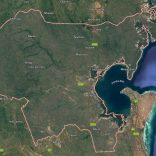Mozambique: Russian ship was fired upon off Cabo Delgado coast, embassy confirms; attackers remain ...
Nyusi inaugurates museum to former political prisoners

In file club of mozambique
Mozambican President Filipe Nyusi on Thursday inaugurated a museum in honour of Mozambican nationalists who were imprisoned by the Portuguese secret police, the PIDE, during the struggle for Mozambican independence.
The museum is inside the premises of the notorious colonial prison at Mabalane, in the southern province of Gaza, and honours the 75 Mozambican political prisoners held there by the PIDE because of their clandestine activities in support of the liberation movement.
In addition to a monument to the former prisoners, the museum includes the cells in which they were held, and the torture room used by the PIDE. Brochures distributed to visitors tell of the resistance activities undertaken by the 75 former prisoners.
Speaking at a rally immediately after inaugurating the museum, Nyusi said that clandestine anti-colonial activities had taken place across the country. “It was in jails such as Mabalane that the PIDE refined its methods for breaking the dreams of freedom borne by the nationalists”, he said.
The clandestine struggle, he added, by its very nature preceded the armed struggle for independence waged by the Mozambique Liberation Front (Frelimo). Some of those who organized clandestine meetings and activities “as well as the places the PIDE used to hold, torture and murder Mozambican nationalists, are not yet known”, and Nyusi suggested this was an aspect of recent Mozambican history that demands further research.
He stressed that ideas of revolt against colonial domination took root in cultural and sporting bodies, while agricultural, civic and mutual aid associations “also served as secure bases for discussing and assessing the various struggles and systems in Africa”.
Those who took part in clandestine activities, said the President, “were firm and fearless nationalists, daring men and women, fighters who did not vacillate in their struggle, in our struggle, even when they had to watch the threats, tortures and barbaric murders of their comrades”.
He stressed that all forms of struggle against colonial rule, and not only the armed struggle, had required courage.
Militants working underground against the colonial regime always had to “seek ways of evading the vigilance of the PIDE in order to pass on the message of freedom and independence to a growing number of fellow countrymen and groups, and to channel new recruits to Frelimo’s armed struggle”.
The clandestine organisations were “unstoppable”, Nyusi said, in channelling men and women who wished to fight to join Frelimo in Tanzania, and from there to the war fronts in the northern and central provinces.
They knew the risks they were running by working underground. They knew, Nyusi said, that once they were in the hands of the PIDE, they would have no access to a lawyer, and that there would be no limit for how long they might be held in detention.
The President argued that some of the prisoners only escaped death because their cause was taken up internationally, at the urging of the founder and first president of Frelimo, Eduardo Mondlane, and of Tanzanian President Julius Nyerere.
The political prisoners held in Mabalane included the late Albino Magaia, the journalist and writer, who wrote of his experiences in the book “Yo Mabalane!”, Cadmiel Muthemba, who later became Minister of Public Works, and Amos Mahanjane and Fernando Fazenda, who became Mozambican ambassadors, to Malawi and South Africa respectively.
Of the 75 former prisoners, only 37 are still alive.












Leave a Reply
Be the First to Comment!
You must be logged in to post a comment.
You must be logged in to post a comment.